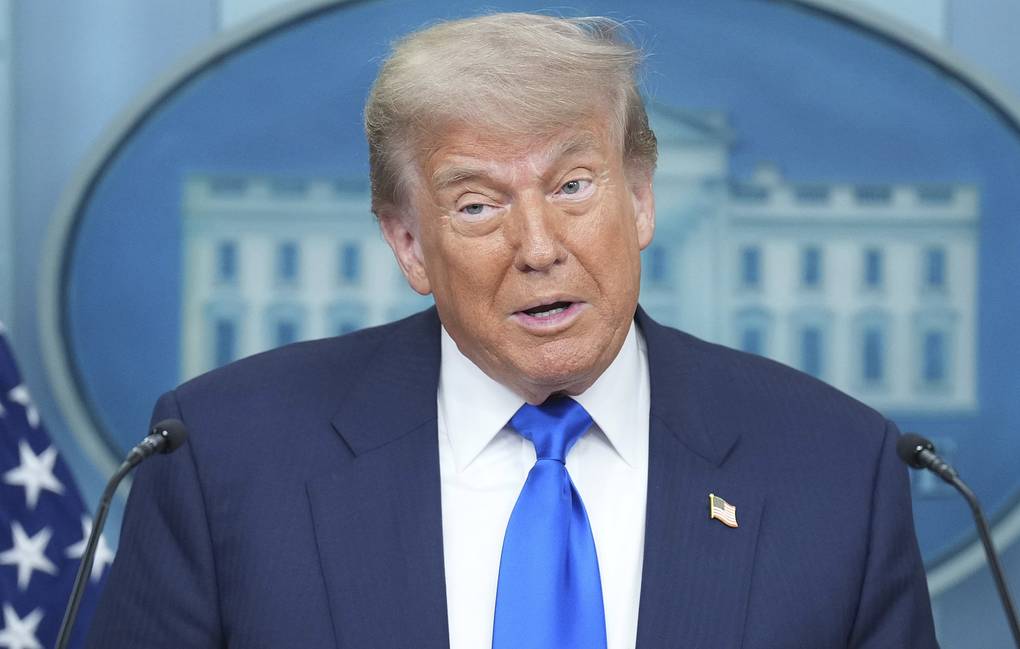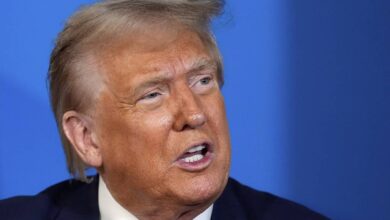Press review: Trump vows more arms for Ukraine as Netanyahu discusses Iran war prospects
Top stories from the Russian press on Wednesday, July 9th US President Donald Trump
US President Donald Trump
MOSCOW, July 9. /TASS/. US President Donald Trump pledges more weapons shipments to Ukraine, and French leader Emmanuel Macron pays a state visit to the United Kingdom to back the coalition of the willing. Meanwhile, Israeli Prime Minister Benjamin Netanyahu talks over prospects of another war on Iran with Trump. These stories topped newspaper headlines across Russia on Wednesday.
Vedomosti: Trump vows additional weapons deliveries to Ukraine
On July 7, President Donald Trump said that the United States must send more weapons to Ukraine. "We are going to send some more weapons. They [the Ukrainians] have to be able to defend themselves. They’re getting hit very hard now. We’re going to send some more weapons — defensive weapons primarily," Trump stated.
-
The Pentagon, too, affirmed that it would resume weapons deliveries to Ukraine. At Trump’s direction, the US Department of Defense said in a press release on its website, it is sending "additional defensive weapons to Ukraine."
Politico reported earlier that the United States had halted some weapons shipments to Kiev, citing declining US stockpiles of munitions as the official reason behind the decision which was initiated by Elbridge Colby, under secretary of defense for policy, who argues that Washington must direct its military power to deny China hegemony over Asia.
On July 4, Trump held a phone call with Russian President Vladimir Putin, and he was not satisfied with its results.
Following the latest conversation with Putin, Trump might have realized that there is no quick solution to the Ukraine conflict in sight, Associate Professor at the Faculty of World Economy and International Affairs at the Higher School of Economics Lev Sokolshchik pointed out to Vedomosti. Moreover, Trump sees it as essential to maintain support for Ukraine both rhetorically and practically, as a collapse of military assistance would represent a defeat for the United States. Trump is also facing pressure from Washington’s NATO allies in Europe, who demand continued backing for Kiev even though they lack the resources to provide substantial aid themselves. Thus, Trump cannot simply walk away from Ukraine, the expert concluded.
According to Prokhor Tebin, Director of the Center for Military-Economic Studies at the Institute of Global Military Economy and Strategy at the Higher School of Economics, Trump would like to send a signal to Moscow that he is losing his patience. Now that the situation around Iran has somewhat stabilized, albeit perhaps temporarily, Trump has revisited the Ukraine issue and he would like to nudge Moscow to intensify protracted negotiations.
US support will not totally disappear, and the amount of munitions supplies paused by the Pentagon was small anyway. However, Trump will hardly decide to "support Kiev as long and as much as it needs," therefore US weapons shipments will not help Kiev gain the upper hand in the armed conflict.
Even as the United States does have the capacity to increase weapons supplies, Tebin continued, it does not have enough political will to do so, especially at its own expense. The Americans would rather be willing to send weapons at the Europeans’ expense, but replenishing its own stockpiles and those of Israel is a priority, the expert insisted.
Izvestia: French leader visits Britain to back coalition of the willing
On July 8, French President Emmanuel Macron arrived in Britain for a three-day visit. A French head of state last crossed the English Channel on a state visit in 2008, when then-president Nicolas Sarkozy met with the late Queen Elizabeth II.
In his first year as UK Prime Minister, Keir Starmer has made five trips to Paris, and the French leader, too, has visited London several times, albeit not on official state visits. This level of engagement has been largely driven by cooperation on Ukraine. To highlight, it was France and Great Britain that launched the "coalition of the willing" last spring, pledging support to Ukraine’s armed forces. The coalition of more than 30 countries, mostly European, says it could deploy a peacekeeping mission to Ukraine.
Speaking at a concluding news conference, the French leader said the coalition "was just a signal that the Europeans will never abandon Ukraine." The coalition was created artificially, and military expert Andrey Klintsevich, who heads the Center for the Study of Political and Military Conflicts, doubts it will be effective in the long run. "Statistics showed that European countries have already exhausted their capacity in terms of sending their outdated weapons to Ukraine. Now, they only have what they have reserved for themselves," he told Izvestia.
German political analyst Alexander Rahr views Macron’s trip to Britain as a demonstration of unity within the European Union without reliance on external players, especially the United States. Notably, the coalition of the willing is scheduled to hold its next meeting in Rome on July 10-11.
"Europe is being pushed to regroup as an autonomous force on the global stage. Hence Macron’s decision to visit London and then take part in another summit in Rome. Europe is trying to align strategies in case the Americans step back from NATO or to decide how to strengthen the continent, how to arm it, and how to begin militarization against Russia. Europe is now tasked with becoming a power independent of America. All meetings, new deals and alliances, including military ones, serve exactly this aim," Rahr explained.
Nezavisimaya Gazeta: Netanyahu discusses prospects of another war on Iran with Trump
Israel is not going to hold back from using force against its opponents in the region, recent talks in the White House between Israeli Prime Minister Benjamin Netanyahu and US President Donald Trump showed. According to Israeli media, during that meeting, the Israeli head of government sought the US leader’s explicit approval of new military operations against Iran. Even as the 12-day war weakened Iran’s nuclear capabilities, the Netanyahu government believes that the Islamic Republic plans to rebuild those.
In turn, Trump expressed hope that it was all over with Iran’s nuclear program following the 12-day war. "I think Iran wants to meet (with US diplomats — Nezavisimaya Gazeta). I think they want to make peace," the US leader said. He made it clear that the United States is not currently considering delivering more strikes on the Islamic Republic.
For the time being, the US and Israeli defense agencies are trying to assess whether the Iranians have significantly intensified activity near nuclear facilities affected by the strikes.
The Iranian Foreign Ministry denied any willingness to hold talks with US diplomats, even as Iranian President Masoud Pezeshkian stated that Tehran sees no problem in negotiating control over its own nuclear program. Masoud’s remarks in an interview with US journalist Tucker Carlson released on July 7 showed that the Islamic Republic will need time to evaluate the damage done by Israel’s Operation Rising Lion so that it can later allow for enough inspectors’ ability to monitor its nuclear program.
Yury Lyamin, a senior researcher at the Center for Analysis of Strategies and Technologies, told Nezavisimaya Gazeta that Iran’s remaining nuclear capabilities lie deep under the ground and that the Iranians would likely extend them deeper down following the recent conflict. "I mean, the Israeli strikes might have largely damaged the surface segment of the Iranian missile and nuclear program," the expert said. "The Iranians believed such a scenario was highly likely as they spent years building underground infrastructure. The hostilities showed that Israel is quite limited in its ability to hit Iranian underground facilities," he explained.
Even as the Americans used their GBU-57 bunker-buster bombs in attacks on Iran’s underground enrichment facilities in Natanz and Fordow, "there are facilities as part of this Iranian nuclear program that lie even deeper under the ground than those which were targeted by the Americans," the expert surmised.
Rossiyskaya Gazeta: Saudi Arabia signals oil prices may not go lower
Saudi Aramco has raised its official selling price for its crude oil destined for Asia, Europe, and North America, or its key markets, in August. The Saudis often follow market trends, and this move may mean that the world’s largest oil producer expects oil prices to remain at around the current level or even go slightly up.
On the other hand, on July 5, OPEC+ agreed to further increase output to 548,000 barrels per day next month which should have pushed prices at least somewhat lower. However, that never happened, and Brent is currently trading at $69.5 per barrel, while it traded $1 lower a week ago. The oil benchmark has seen a 15% rise from its low in early May.
Mark Shumilov, resources sector analyst at Renaissance Capital, sees three major reasons behind the recent increase in oil prices, namely, a seasonal demand hike, the ongoing compensation for OPEC+ overproduction in previous periods, and a time lag between production growth and actual market oil supply. Brent is now trading much lower from last year’s levels when a barrel was priced at $85, the expert recalled.
Valery Andrianov, associate professor of the Financial University at the Government of the Russian Federation, told Rossiyskaya Gazeta that neither Saudi Arabia, nor any other member of OPEC+ can actually control oil prices. They can only adjust their selling price to market realities. And Saudi Aramco’s latest decision shows that Riyadh expects oil price stability even as the OPEC+ alliance increases output.
Experts mostly doubt oil prices will rise higher from today’s levels. Dmitry Skryabin, a portfolio manager at Alfa-Capital, says there could be oversupply in the oil market by the year’s end amid the latest production quota increase agreed by OPEC+. Meanwhile, though, the expert views $70 per barrel as a sustainable level.
Andrianov argues that it would be good if oil prices stay between $65 and $70 per barrel in the mid-term, a range that he says crude could go beyond in the event of another escalation in the Middle East or if relations between China and the United States sour.
Kommersant: Coal prices may stabilize in 2026-2027 amid deficit
In the second half of 2025 and through next year, global and Russian coal prices may go up as electricity demand, mostly in China and India, grows, and solid fuel will account for 30% of the energy balance. Moreover, the protracted crisis facing the industry will cause a reduction in the supply which would slow falling coal prices.
In 2025, the coal market will remain under pressure amid a slowdown in the global economy and a drop in demand. However, extreme weather phenomena may trigger an unpredictable price correction, causing a short-term rebound on the market, forecasts from NEFT Research seen by Kommersant show. High global demand for electricity will make it possible for coal to have a stable 26% to 27% share in the global energy balance in 2026-2027.
In the first half of 2025, demand for coal was low amid a relatively warm winter in Asia, an early start to the rainy season, and difficulties with the growth of industrial production. "In 2026, these factors will not coincide again which would trigger a growth in coal consumption," Alexander Titov, an expert at the Institute for Energy and Finance, believes.
The International Energy Agency (IEA) is less optimistic as it revealed that coal-fired power generation saw a less than 1% rise even as total generation from all sources increased by 4%, with China and India accounting for the bulk of that growth. "The situation in these countries will continue to drive global demand for thermal coal which will rise, indeed, amid electricity consumption in the region where, unlike in the United States or Europe, new infrastructure has been rapidly introduced," chief economist at the Stolypin Institute for Growth Economics, Boris Kopeikin, told Kommersant.

